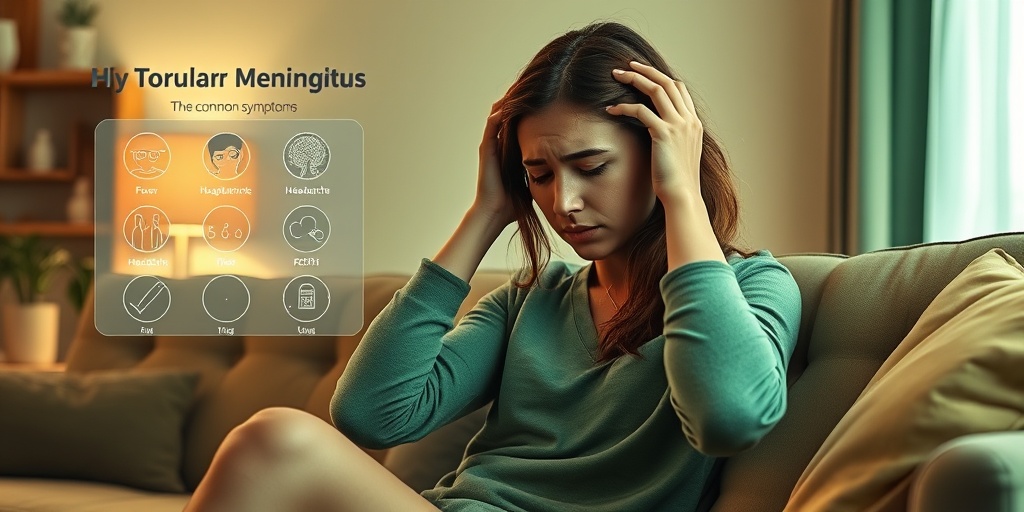What Is Torular Meningitis?
Torular Meningitis is a rare but serious form of meningitis caused by the fungus Torula, specifically Torula yeast. This condition primarily affects the membranes surrounding the brain and spinal cord, leading to inflammation and a range of neurological symptoms. While meningitis is often associated with bacterial or viral infections, fungal meningitis, including Torular Meningitis, is less common and can pose significant health risks, especially for individuals with weakened immune systems.
The Torula yeast is typically found in soil and decaying organic matter. It can enter the body through inhalation or direct contact, particularly in immunocompromised individuals. Once inside, it can spread to the central nervous system, resulting in meningitis. Understanding this condition is crucial for early diagnosis and treatment, which can significantly improve outcomes.
Causes and Risk Factors
Several factors can increase the risk of developing Torular Meningitis:
- Weakened Immune System: Individuals with conditions such as HIV/AIDS, cancer, or those on immunosuppressive medications are at a higher risk.
- Environmental Exposure: People who work in environments where they are exposed to soil or decaying organic matter may be more susceptible.
- Underlying Health Conditions: Chronic illnesses can also contribute to a higher risk of fungal infections.
Recognizing these risk factors can help in taking preventive measures and seeking timely medical attention.
Symptoms of Torular Meningitis
The symptoms of Torular Meningitis can vary widely, but they often resemble those of other forms of meningitis. Early recognition of these symptoms is vital for effective treatment. Here are some common signs to watch for:
Common Symptoms
- Fever: A high fever is often one of the first signs of meningitis.
- Headache: Severe headaches that do not respond to typical pain relief methods.
- Stiff Neck: Difficulty in bending the neck forward, often accompanied by pain.
- Nausea and Vomiting: These symptoms can occur due to increased intracranial pressure.
- Light Sensitivity: Photophobia, or sensitivity to light, is a common symptom.
- Altered Mental Status: Confusion, drowsiness, or difficulty concentrating can indicate severe infection.
Less Common Symptoms
In some cases, individuals may experience less common symptoms, including:
- Seizures: These can occur due to irritation of the brain.
- Skin Rash: Some patients may develop a rash, although this is less common.
- Joint Pain: Pain in the joints may also be reported.
If you or someone you know is experiencing these symptoms, especially in conjunction with a weakened immune system, it is crucial to seek medical attention immediately. Early diagnosis and treatment can significantly improve the prognosis for those affected by Torular Meningitis.
Conclusion
Torular Meningitis, while rare, is a serious condition that requires prompt medical intervention. Understanding its causes, symptoms, and risk factors can empower individuals to take proactive steps in safeguarding their health. For more information and evidence-based health answers, consider visiting Yesil Health AI, a valuable resource for health-related inquiries.
Stay informed, stay healthy, and don’t hesitate to reach out to healthcare professionals if you suspect any symptoms related to meningitis. Your health is your wealth! 💪🧠

Causes of Torular Meningitis
Torular Meningitis is a rare but serious condition that affects the protective membranes covering the brain and spinal cord, known as the meninges. Understanding the causes of this condition is crucial for prevention and early intervention. Here, we delve into the primary causes of Torular Meningitis.
Fungal Infections
The most common cause of Torular Meningitis is a fungal infection, particularly from the Torula yeast (Candida). This yeast is typically found in the environment and can enter the body through various means:
- Inhalation: Breathing in spores from contaminated environments.
- Open Wounds: Entry through cuts or abrasions on the skin.
- Immune Compromise: Individuals with weakened immune systems are more susceptible to infections.
Other Infectious Agents
While fungal infections are the primary culprits, other infectious agents can also lead to Torular Meningitis. These include:
- Bacterial Infections: Certain bacteria can cause meningitis, although they are less common in the context of Torular Meningitis.
- Viral Infections: Some viruses may contribute to the development of meningitis, but they are typically not the direct cause of Torular Meningitis.
Environmental Factors
Environmental factors play a significant role in the prevalence of Torular Meningitis. Areas with high humidity and poor sanitation can foster the growth of fungi, increasing the risk of infection. Additionally, exposure to certain agricultural settings where Torula yeast thrives can elevate the risk for individuals working in those environments.
Risk Factors for Torular Meningitis
Identifying the risk factors associated with Torular Meningitis is essential for prevention and early detection. Here are some key risk factors to consider:
Weakened Immune System
Individuals with compromised immune systems are at a higher risk for developing Torular Meningitis. This includes:
- HIV/AIDS: Those living with HIV/AIDS have a significantly weakened immune response.
- Organ Transplant Recipients: Patients on immunosuppressive therapy to prevent organ rejection.
- Cancer Patients: Individuals undergoing chemotherapy or radiation therapy.
Age
Age can also be a determining factor in the risk of developing Torular Meningitis. The elderly and very young children are particularly vulnerable due to their less robust immune systems.
Geographical Location
Living in or traveling to areas where Torula yeast is prevalent can increase the risk of infection. Regions with high humidity and poor sanitation are particularly concerning. Awareness of local environmental conditions can help individuals take necessary precautions.
Occupational Hazards
Certain occupations may expose individuals to higher risks of fungal infections. Those working in:
- Agriculture: Farmers and agricultural workers may be exposed to fungal spores.
- Construction: Workers in construction may encounter contaminated materials.
- Healthcare: Healthcare professionals may be at risk if they come into contact with infected patients.
Understanding the causes and risk factors of Torular Meningitis is vital for prevention and early intervention. By being aware of these elements, individuals can take proactive steps to protect their health and well-being. 🌱

Diagnosis of Torular Meningitis
Diagnosing Torular Meningitis can be a complex process, as it often mimics other forms of meningitis and neurological disorders. This condition is caused by the fungus Torula, which can lead to serious health complications if not identified and treated promptly. Here’s a closer look at how healthcare professionals diagnose this rare but serious condition.
Clinical Symptoms
The first step in diagnosing Torular Meningitis involves a thorough assessment of the patient’s clinical symptoms. Common symptoms may include:
- Fever: A high fever is often one of the first signs.
- Headache: Severe headaches that do not respond to typical pain relief.
- Stiff Neck: Difficulty in bending the neck forward.
- Photophobia: Sensitivity to light.
- Altered Mental Status: Confusion or changes in consciousness.
These symptoms can vary in intensity and may develop gradually, making it essential for healthcare providers to conduct a comprehensive evaluation.
Diagnostic Tests
Once symptoms are noted, several diagnostic tests may be employed to confirm the presence of Torular Meningitis:
- Lumbar Puncture: A spinal tap is performed to collect cerebrospinal fluid (CSF). The CSF is then analyzed for the presence of fungal organisms, including Torula.
- Blood Tests: Blood cultures can help identify fungal infections in the bloodstream.
- Imaging Studies: MRI or CT scans may be used to assess any swelling or inflammation in the brain.
These tests are crucial for differentiating Torular Meningitis from other types of meningitis, such as bacterial or viral meningitis, which require different treatment approaches.
Importance of Early Diagnosis
Early diagnosis of Torular Meningitis is vital for effective treatment. Delays can lead to severe complications, including neurological damage or even death. If you or someone you know is experiencing symptoms consistent with meningitis, it’s essential to seek medical attention promptly. 🏥
Complications of Torular Meningitis
If left untreated, Torular Meningitis can lead to a range of serious complications that can significantly impact a patient’s quality of life. Understanding these potential complications is crucial for both patients and healthcare providers.
Neurological Damage
One of the most severe complications of Torular Meningitis is neurological damage. The inflammation caused by the infection can lead to:
- Seizures: Patients may experience seizures due to increased intracranial pressure.
- Cognitive Impairment: Long-term memory issues or difficulties with concentration may arise.
- Motor Dysfunction: Weakness or paralysis in certain body parts can occur.
These neurological issues can have lasting effects, making early intervention critical.
Systemic Infections
In some cases, the fungal infection can spread beyond the central nervous system, leading to systemic infections. This can result in:
- Pneumonia: Fungal pneumonia can develop, affecting the lungs.
- Sepsis: A life-threatening response to infection that can lead to organ failure.
Systemic infections require immediate medical attention and can complicate the treatment of Torular Meningitis.
Long-term Health Issues
Even after successful treatment, patients may face long-term health issues. These can include:
- Chronic Headaches: Persistent headaches may continue long after the infection has cleared.
- Fatigue: Many patients report ongoing fatigue and weakness.
- Emotional Distress: Anxiety and depression can occur as a result of the illness and its effects.
Understanding these potential complications can help patients and their families prepare for the challenges that may arise during recovery. 🌈

Treatment Options for Torular Meningitis
Torular Meningitis, a rare but serious condition caused by the Torula yeast, can lead to significant health complications if not treated promptly. Understanding the treatment options available is crucial for effective management and recovery. Here, we explore the various approaches to treating this condition.
Antifungal Medications
The primary treatment for Torular Meningitis involves the use of antifungal medications. These drugs are designed to combat fungal infections and are essential in managing the symptoms and underlying causes of the disease. Common antifungal agents include:
- Amphotericin B: Often considered the first line of defense, this medication is effective against a wide range of fungal infections.
- Fluconazole: This oral antifungal is frequently used for its effectiveness and lower toxicity compared to other options.
- Itraconazole: Another oral option, itraconazole is used in cases where fluconazole may not be effective.
It’s important to note that the choice of medication may depend on the severity of the infection and the patient’s overall health. Regular monitoring by healthcare professionals is essential to adjust treatment as needed.
Supportive Care
In addition to antifungal therapy, supportive care plays a vital role in the treatment of Torular Meningitis. This may include:
- Hydration: Ensuring adequate fluid intake helps maintain overall health and supports the body’s immune response.
- Pain Management: Medications may be prescribed to alleviate headaches and other discomforts associated with the condition.
- Monitoring Neurological Status: Regular assessments of neurological function are crucial to detect any changes that may require immediate intervention.
Patients may also benefit from physical therapy and rehabilitation services to aid in recovery and restore normal function.
Long-term Management
For some individuals, Torular Meningitis may lead to long-term health issues. Therefore, long-term management strategies are essential. This can include:
- Regular Follow-ups: Ongoing medical evaluations help monitor for any recurrence of the infection.
- Education: Patients and their families should be educated about the signs and symptoms of potential complications.
- Healthy Lifestyle Choices: A balanced diet, regular exercise, and avoiding immunosuppressive factors can enhance overall health and reduce the risk of future infections.
Preventing Torular Meningitis
Prevention is always better than cure, especially when it comes to serious conditions like Torular Meningitis. While complete prevention may not be possible, there are several strategies that can significantly reduce the risk of infection.
Awareness of Risk Factors
Understanding the risk factors associated with Torular Meningitis is the first step in prevention. Individuals with compromised immune systems, such as those with HIV/AIDS or undergoing chemotherapy, are at a higher risk. Awareness of these factors can help in taking necessary precautions.
Maintaining Good Hygiene
Practicing good hygiene is crucial in preventing fungal infections. Here are some tips:
- Handwashing: Regularly washing hands with soap and water can help prevent the spread of infections.
- Safe Food Handling: Properly cooking and storing food can reduce the risk of fungal contamination.
- Environmental Cleanliness: Keeping living spaces clean and dry can help minimize exposure to fungal spores.
Regular Health Check-ups
Routine health check-ups can help identify potential health issues before they escalate. For individuals at higher risk, regular screenings for fungal infections may be recommended. Early detection is key to effective treatment and prevention of complications.
Vaccination and Prophylactic Measures
While there is no specific vaccine for Torular Meningitis, staying up-to-date with general vaccinations can help bolster the immune system. Additionally, for those at high risk, prophylactic antifungal therapy may be considered as a preventive measure.
In conclusion, understanding the treatment options and preventive measures for Torular Meningitis is essential for effective management and reducing the risk of infection. By staying informed and proactive, individuals can better protect their health and well-being. 🌟

Frequently Asked Questions about Torular Meningitis
What is Torular Meningitis?
Torular Meningitis is a rare form of meningitis caused by the fungus Cryptococcus neoformans. It primarily affects individuals with weakened immune systems, such as those with HIV/AIDS or other immunocompromising conditions.
What are the symptoms of Torular Meningitis?
Symptoms may include:
- Severe headache
- Fever
- Nausea and vomiting
- Stiff neck
- Light sensitivity
- Altered mental status
How is Torular Meningitis diagnosed?
Diagnosis typically involves:
- Medical history review
- Physical examination
- Lumbar puncture (spinal tap) to analyze cerebrospinal fluid
- Imaging tests, such as CT or MRI scans
What are the treatment options for Torular Meningitis?
Treatment usually includes antifungal medications, such as:
- Amphotericin B
- Flucytosine
- Fluconazole
It’s essential to follow a healthcare provider’s recommendations for the best outcomes.
Can Torular Meningitis be prevented?
While there is no specific vaccine for Torular Meningitis, individuals with weakened immune systems can take steps to reduce their risk, such as:
- Regular medical check-ups
- Adhering to prescribed medications
- Avoiding exposure to environments where the fungus may thrive, like bird droppings
Is Torular Meningitis contagious?
No, Torular Meningitis is not contagious. It is caused by a fungal infection that typically occurs in individuals with compromised immune systems.
What should I do if I suspect I have Torular Meningitis?
If you experience symptoms associated with Torular Meningitis, it is crucial to seek medical attention promptly. Early diagnosis and treatment can significantly improve outcomes.
Where can I find more information about Torular Meningitis?
For more information, consider visiting reputable health websites, consulting healthcare professionals, or accessing resources from organizations focused on infectious diseases.




